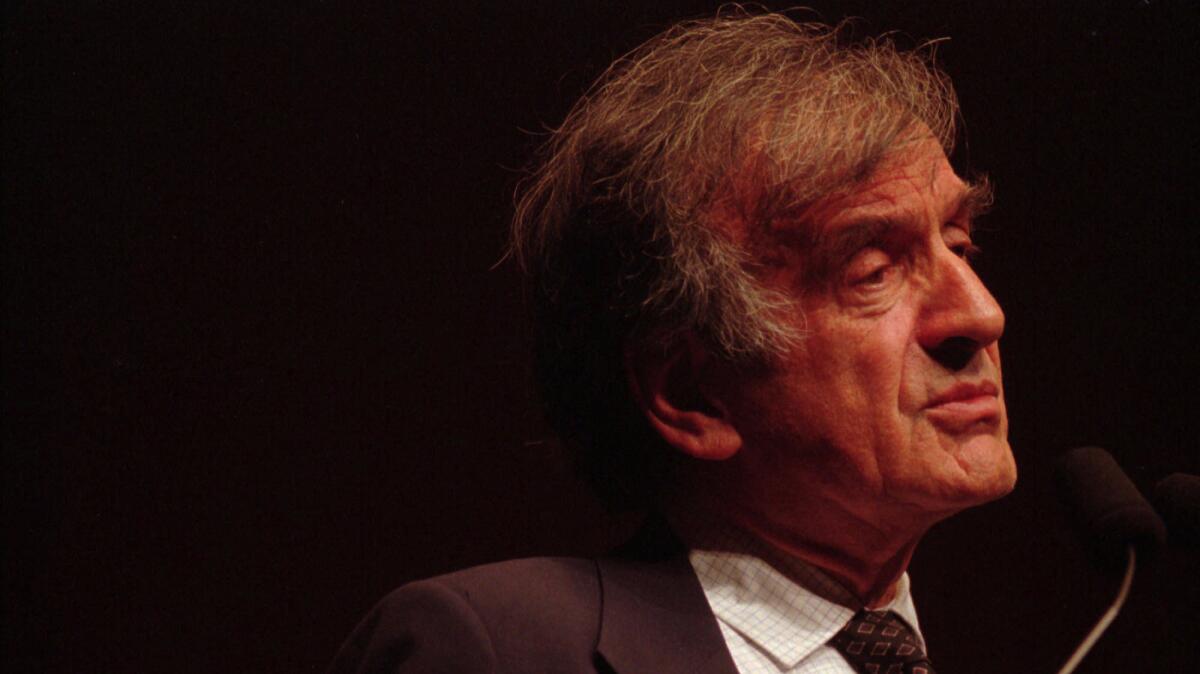From the Archives: Peace Prize accepted for all Holocaust survivors

Holocaust survivor Elie Wiesel, an American writer and human rights advocate, received the 1986 Nobel Peace Prize on Wednesday and said the honor belongs to all survivors of the Nazi death camps and their children.
Norwegian Nobel Committee Chairman Egil Aarvik gave Wiesel the gold medal and diploma at ceremonies in Oslo University’s Aula Festival Hall attended by 800 people, including King Olaf V and government leaders. The prize also includes $290,000.
The award was “in recognition of this particular human spirit’s victory over the powers of death and degradation, and as a support to the rebellion against evil in the world. . . ,” Aarvik said.
The Nobel prizes for physics, chemistry, medicine, economics and literature were presented Wednesday in Stockholm.
His Son on Podium
In a departure from tradition, Wiesel’s teen-age son, Shlomo Elisha, was invited to join his father on the podium for the awarding of the prize.
Obviously moved, the 58-year-old Wiesel asked the king’s permission to say a brief blessing. “Thank you oh Lord, for giving us this day,” he said.
In his emotional acceptance speech, Wiesel said: “Do I have the right to represent the multitudes who have perished? Do I have the right to accept this great honor on their behalf? I do not. No one may speak for the dead, no one may interpret their mutilated dreams and visions. . . .
“This honor belongs to all the survivors and their children, and through us, to the Jewish people with whose destiny I have always identified. . . .”
Wiesel said it “would be unnatural for me not to make Jewish priorities my own: Israel, Soviet Jewry, Jews in Arab lands . . . but there are others as important to me.”
Methods Deplored
He said Palestinians were a people “to whose plight I am sensitive but whose methods I deplore when they lead to violence.”
“Both the Jewish people and the Palestinian people have lost too many sons and shed too much blood. This must stop, and all attempts to stop it must be encouraged,” he said.
Aarvik noted it has been 50 years since the peace prize was awarded to Carl von Ossietzky, the German pacifist who before World War II warned of the Nazi threat to democracy.
“His testimony was, however, also his doom--Ossietzky did not survive his meeting with the terrible regime which had established itself in the heart of Europe. Today, 50 years later, the peace prize is to be presented to one who survived,” Aarvik said.
“From the abyss of the death camps he has come as a messenger to mankind--not with a message of hate and revenge, but with one of brotherhood and atonement,” he said. “Elie Wiesel is not only the man who survived--he is also the spirit which has conquered.”
Parade Past Hotel
Thousands of Norwegians in a torchlight procession later filed past the Grand Hotel where Wiesel and his family were staying.
As the marchers sang “We Shall Overcome,” the peace laureate and his wife and son waved from a balcony.
The Nobel prize winners were announced in October, but the awards are always presented on Dec. 10, the anniversary of the death in 1896 of Swedish dynamite inventor and industrialist Alfred Nobel, who established the awards in his will.
The other Nobel prizes and their winners were:
--For literature, Nigerian Wole Soyinka, a playwright, poet and novelist, and the first African ever to receive the prize.
--For medicine, American Stanley Cohen and Italian-American Rita Levi-Montalcini for discoveries of “growth factors” in human and animal tissue.
--For physics, West German Ernst Ruska for fundamental work in electron optics and designing the first electron microscope, and West German Gerd Binnig and Heinrich Rohrer, from Switzerland, for design of a scanning tunneling microscope, which has made possible the first pictures of individual atoms.
--For chemistry, Americans Dudley R. Herschbach and Yuan T. Lee, and Canadian John C. Polanyi for a pioneering study of basic chemical reactions.
--For economics, American James McGill Buchanan for development of bases for the theory of economical and political decision-making.
More to Read
Sign up for Essential California
The most important California stories and recommendations in your inbox every morning.
You may occasionally receive promotional content from the Los Angeles Times.










